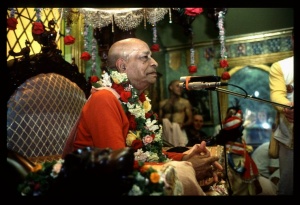SB 5.10.15

A.C. Bhaktivedanta Swami Prabhupada
TEXT 15
- sa cāpi pāṇḍaveya sindhu-sauvīra-patis tattva-jijñāsāyāṁ
- samyak-śraddhayādhikṛtādhikāras tad dhṛdaya-granthi-mocanaṁ
- dvija-vaca āśrutya bahu-yoga-grantha-sammataṁ tvarayāvaruhya
- śirasā pāda-mūlam upasṛtaḥ kṣamāpayan vigata-nṛpa-deva-smaya uvāca
SYNONYMS
saḥ—he (Mahārāja Rahūgaṇa); ca—also; api—indeed; pāṇḍaveya—O best of the Pāṇḍu dynasty (Mahārāja Parīkṣit); sindhu-sauvīra-patiḥ—the King of the states known as Sindhu and Sauvīra; tattva-jijñāsāyām—in the matter of inquiring about the Absolute Truth; samyak-śraddhayā—by faith consisting of complete control of the senses and the mind; adhikṛta-adhikāraḥ—who attained the proper qualification; tat—that; hṛdaya-granthi—the knot of false conceptions within the heart; mocanam—which eradicates; dvija-vacaḥ—the words of the brāhmaṇa (Jaḍa Bharata); āśrutya—hearing; bahu-yoga-grantha-sammatam—approved by all yogic processes and their scriptures; tvarayā—very hastily; avaruhya—getting down (from the palanquin); śirasā—by his head; pāda-mūlam—at the lotus feet; upasṛtaḥ—falling down flat to offer obeisances; kṣamāpayan—obtaining pardon for his offense; vigata-nṛpa-deva-smayaḥ—giving up the false pride of being the King and therefore being worshipable; uvāca—said.
TRANSLATION
Śukadeva Gosvāmī continued: O best of the Pāṇḍu dynasty [Mahārāja Parīkṣit], the King of the Sindhu and Sauvīra states [Mahārāja Rahūgaṇa] had great faith in discussions of the Absolute Truth. Being thus qualified, he heard from Jaḍa Bharata that philosophical presentation which is approved by all scriptures on the mystic yoga process and which slackens the knot in the heart. His material conception of himself as a king was thus destroyed. He immediately descended from his palanquin and fell flat on the ground with his head at the lotus feet of Jaḍa Bharata in such a way that he might be excused for his insulting words against the great brāhmaṇa. He then prayed as follows.
PURPORT
In Bhagavad-gītā (BG 4.2) Lord Kṛṣṇa says:
- evaṁ paramparā-prāptam
- imaṁ rājarṣayo viduḥ
- sa kāleneha mahatā
- yogo naṣṭaḥ parantapa
"This supreme science was thus received through the chain of disciplic succession, and the saintly kings understood it in that way. But in course of time the succession was broken, and therefore the science as it is appears to be lost."
Through the disciplic succession the royal order was on the same platform as great saintly persons (rāja-ṛṣis). Formerly they could understand the philosophy of life and knew how to train the citizens to come to the same standard. In other words, they knew how to deliver the citizens from the entanglement of birth and death. When Mahārāja Daśaratha ruled Ayodhyā, the great sage Viśvāmitra once came to him to take away Lord Rāmacandra and Lakṣmaṇa to the forest to kill a demon. When the saintly person Viśvāmitra came to the court of Mahārāja Daśaratha, the King, in order to receive the saintly person, asked him, aihiṣṭaṁ yat tat punar janma jayāya. He asked the sage whether everything was going on well in his endeavor to conquer the repetition of birth and death. The whole process of Vedic civilization is based on this point. We must know how to conquer the repetition of birth and death. Mahārāja Rahūgaṇa also knew the purpose of life; therefore when Jaḍa Bharata put the philosophy of life before him, he immediately appreciated it. This is the foundation of Vedic society. Learned scholars, brāhmaṇas, saintly persons and sages who were fully aware of the Vedic purpose advised the royal order how to benefit the general masses, and by their cooperation, the general masses were benefited. Therefore everything was successful. Mahārāja Rahūgaṇa attained this perfection of understanding the value of human life; therefore he regretted his insulting words to Jaḍa Bharata, and he immediately descended from his palanquin and fell down at the lotus feet of Jaḍa Bharata in order to be excused and to hear from him further about the values of life known as brahma jijñāsā (inquiry into the Absolute Truth). At the present moment, high government officials are ignorant of the values of life, and when saintly persons endeavor to broadcast the Vedic knowledge, the so-called executives do not offer their respectful obeisances but try to obstruct the spiritual propaganda. Thus one can say that the former kingly government was like heaven and that the present government is like hell.